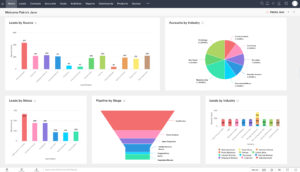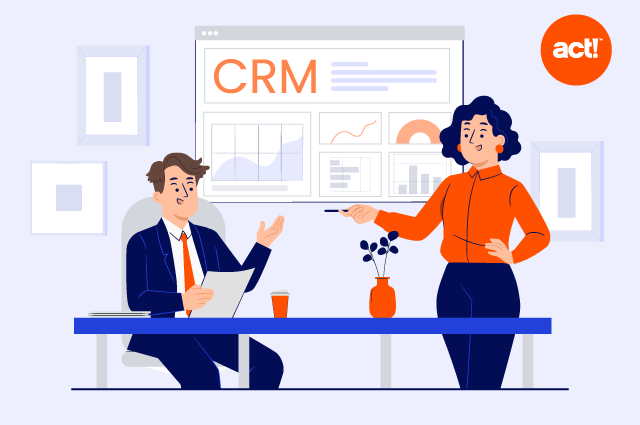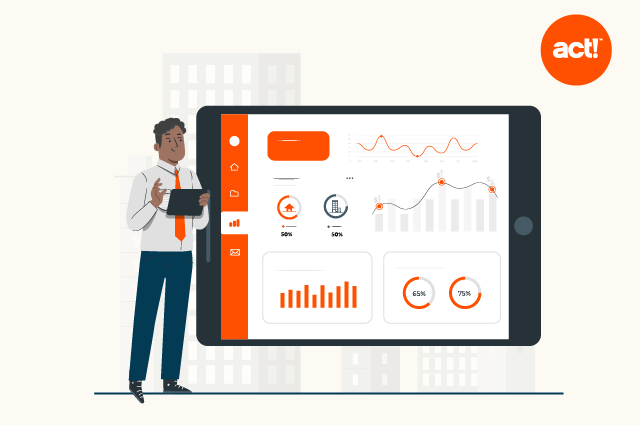
In the world of real estate, the two most important things are the market prices and your client rolodex.
Not much you can do about the former, but when it comes to managing relationships, every realtor has their own method. Some like to keep track of every interaction in their heads, while others will rely on scribbled notes and hastily typed spreadsheets.
But the savviest real estate professionals will know that nothing beats a good CRM tool.
Why Use a CRM Tool for Real Estate?
CRM stands for Customer Relationship Management, and lets you do just that: manage client relationships. In addition to contact management, you can add notes, schedule your next appointments, and much more. In short, a CRM system is a technology that manages the small details so you can keep your eye on the prize – closing more deals.
Now for the benefits, here is what you should be to accomplish with the right CRM setup:
- Improve team collaboration: by integrating data from numerous departments, you can reduce silos and foster cooperation. For instance, you could maximize teamwork between Marketing and Sales by immediately passing leads found on your website (marketing) to the best salesperson for conversion.
- Streamline your sales pipeline and improve your sales process: CRM software can help you visualize your sales pipelines, which lets you identify what works and what needs improvement.
- Boost productivity with automation: If your real estate agency needs to go through numerous repetitive tasks, you could speed things up drastically with a CRM tool that supports automated processes. For instance, you could ensure that it only takes one click to schedule follow-ups with potential buyers, send email campaigns, or assign contacts to the right realtor in seconds.
- Strengthen your customer support: A CRM platform is also great as a support tool. Since you keep all the info relating to a client in one place, it’s easier to offer personalized support that really meets their needs and makes them feel special and looked after.
- Enable flexible work setups: this is especially important for realtors who are often on the move or on-site. A good cloud CRM tool should be available 24/7 and on any device, including smartphones, tablets, and laptops. That means you could expand your workforce with remote employees, and even those who are far from your main real estate agency office will be able to access the same always up-to-date client data.
- Ensure consistent reporting: most CRM software will come with in-depth reporting features, which can help you work with accurate data. You can use these analytics to make more informed business decisions, A/B test marketing techniques, and generally get better insights into what works and what doesn’t at your real estate company.
What is the Best Real Estate CRM Solution?
Below are some of the most popular real estate CRM software tools, including famous names and all-in-one solutions that include listing websites.
Salesforce
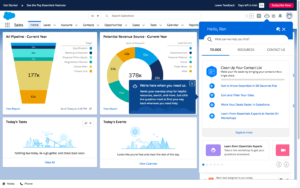
Salesforce is a market leader, and also probably one of the best-known CRM providers in the world. Their solution is suitable for all kinds of businesses, including real estate companies thanks to features such as pipeline management, lead scoring, and extremely powerful reporting.
However, be aware that Salesforce is aimed at mid-market companies with deeper pockets. While their entry tier is comparable in price with Act!, the features are severely limited. You’ll need to pay at least $75 per user per month, and that doesn’t include phone support (add an extra 20% of the price per user per month) or marketing automation (starting at a prohibitive $1,250 per month!). For instance, additional custom fields do come with the Enterprise tier, but at $150 per user per month, it’s still a hefty investment. And that’s not all, once set up, it can cost more to maintain than to purchase the software. Most companies need to hire a Salesforce administrator just to groom their Salesforce, for instance.
Still, it could be worth it if you already use Salesforce as your primary selling tool. Just remember that integration and training can take 5-10 days (and cost up to $5K), but you will end up with a robust and reliable CRM tool.
Finally, Salesforce does have a more affordable solution for SMBs, called Salesforce Essentials. Its price aligns with that of other tools like Act!, but you do miss out on features like email marketing or call lists and hot leads.
Salesforce Pros:
- Perfect integration with other Salesforce tools
- Powerful reporting
- A mature, reliable solution
Salesforce Cons:
- Lengthy integration and staff training
- Limited custom field options
- Large number of upsells and paid add-ons
- Expensive
Zoho CRM
Another well-known name in the world of CRM is Zoho CRM, which is especially popular thanks to its free version and low-cost options. Of course, the features will be limited depending on your plan, but the customization options, built-in campaigns, and easy invoicing features can make it worthwhile for realtors.
On the downside, their email marketing can leave a lot to be desired as it doesn’t offer automation to follow up on leads based on their interactions with your team. Support is also notoriously patchy, probably because the company’s user base is so huge (with many users on the free plan).
Zoho CRM Pros:
- Free plan
- Fairly priced Enterprise plan
- Integrated invoicing feature
Zoho CRM Cons:
- No email automation
- Slow, low-quality support
- Feature gating produces forced upgrades and abrupt price increases for basic add-ons and features
HubSpot CRM
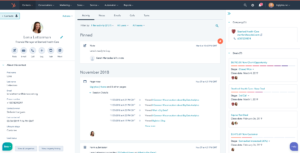
HubSpot is known for its excellent software and strong online presence. The free offer with limited features is attractive to freelancers and real estate company owners with few staff members.
On the downside, the scaling options aren’t so attractive, as you’ll need to fork out between $4000 – $9000 in onboarding fees for the Professional or Enterprise plan. These give you all the features you should expect out of the box, such as lead scoring and call lists. However, their Growth Suite is more affordable, starting at $50 per user per month when paid annually upfront. Otherwise, it’s $112.50/month.
HubSpot CRM Pros:
- Free plan
- Robust software
- Kanban board pipeline management
HubSpot CRM Cons:
- Expensive onboarding & plans make it cost-prohibitive for SMBs
- Too few features in the free plan
How Act! Does CRM for Real Estate
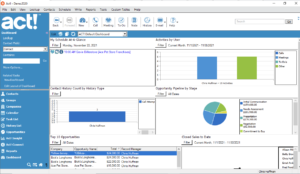
Our own solution is designed specifically around the needs of small to medium businesses. We know and understand the challenges faced by real estate agents and independent realtors, which is why we’ve built in all the features you need to grow at an affordable price point, with no hidden costs and extra CRM integration fees.
- Powerful built-in tools: Manage customer relationships with groups and filters, opportunity tracking, lead management tools, such as call lists, and hot leads, and much more.
- Easy setup: Act! has one of the most straightforward onboarding processes and learning curves for newcomers to the world of CRM. The stunning dashboard is modern, intuitive, and fully customizable to adapt to how you want to deal with clients, former buyers, and future leads.
- Cloud-based technology: run your business 24/7 and wherever you are. The mobile app means you always stay updated with the latest customer info, so clients always feel acknowledged and supported.
- Clear, transparent pricing: we offer three plans with clear prices per user per month. You can add unlimited users and scale your real estate company with complete control over costs and ROI.
- Email marketing: send up to tens of thousands of emails per month to as many contacts as you need, and reduce your costs in other newsletter tools.
- Powerful automation: benefit from pre-built email campaigns, social sharing, and design specific landing pages to send buyers to the listing of their dreams. You’ll get all the opportunities you need to automatically capture leads and speed up the process of turning interested prospects into homeowners!
And best of all, you can try the entire platform for free using this link!
What Act! Real Estate Users Say
“If I didn’t have it, I’d be lost. I wouldn’t know where to turn. My Act! as a resource is worth at least $500,000 to me.” Hal Hanstein, president of Cardinal Realty Group, a commercial real estate company based in St. Louis, Missouri.
“I can really tailor my marketing with Act! Marketing Automation. And once the campaigns are set up, they happen automatically, so I can put more time and energy into other things.” Jeffrey Gazlay, Broker Associate at Paul Homes, one of SouthWest Florida’s leading custom property builders.
“So all through that quarter, I was consistently handling 21 to 22 contracts. I certainly couldn’t have done what I did without my system in Act!.” Gretchen Osgood, Real Estate Agent and Principal Broker at Hawaiian Isle Real Estate.
What About Real Estate-Specific CRM Platforms?
The good news is that on top of the most popular customer relationship management software solutions, the last few years have seen a boom in the number of industry-specific tools. Real estate is no exception, and you’ll now find dozens of decent realtor CRM tools, some of them even built on the Salesforce platform as a special integration.
Propertybase
One of those Salesforce-powered tools is Propertybase, which starts at $89 per month, including marketing automation and IDX so that you can have full integration between listings and customer management. For the website and lead generation tools, the prices do shoot up to $399 a month, but it could be worth it if you use it for mass email and save up on newsletter provider costs.
LionDesk
Next on the list is the much more affordable LionDesk, which offers two plans at $25 and $49 per month. The higher tier includes customizable fields and the innovative text2Sell feature, which lets you send messages to leads directly from their dashboard. They also offer a third plan at $99 per month, including 3rd party integration setup, priority support, and 1:1 training, amongst other additional benefits.
Unfortunately, the dashboard is a shortcoming of the web app, as it often feels a bit cluttered and hard to navigate. Maybe a future UX overhaul will make it a better option for real estate agents who want the best of all worlds.
IXACT Contact
Finally, a strong competitor to PropertyBase for the best real estate CRM system + IDX website tool for realtors is IXACT Contact. They have a great promo for new agents (US only) who have been licensed for less than a year, including free social media contact scanning and mass mailing.
You can then customize the plan based on the features you need, starting at around $33 per user per month, plus $23 per extra team member, and $33 per month to link your listings website.
Do You Need a Real-Estate Specific CRM Tool?
If you are new to the real estate industry, it can be worth looking at the real estate software mentioned above. You could benefit from getting an all-in-one offer where you create a website that integrates with your CRM solution.
Aside from the fact that these tools tend to be pricier than standard CRMs, you should also note that these platforms attempt to lock you into their own ecosystem, which could be challenging as you need to grow and adapt your business. For instance, if you end up needing certain features for your listing website or CRM, you won’t have the flexibility of migrating all your content at once.
Finding The Best CRM For Real Estate: Next Steps
Interested in CRMs even if you’re not a real estate broker? Maybe you’re a small business owner, but you’re not sure which solution is right for you? You can find more information in our post about CRM for small businesses. We even have a full ebook guide for you to pore over the best CRM features in your own time. You can download it from here.
Still have questions? Or ready to try Act! and all its features for your real estate business? Don’t hesitate to get in touch today, or jump straight to your free trial of Act! CRM today!



